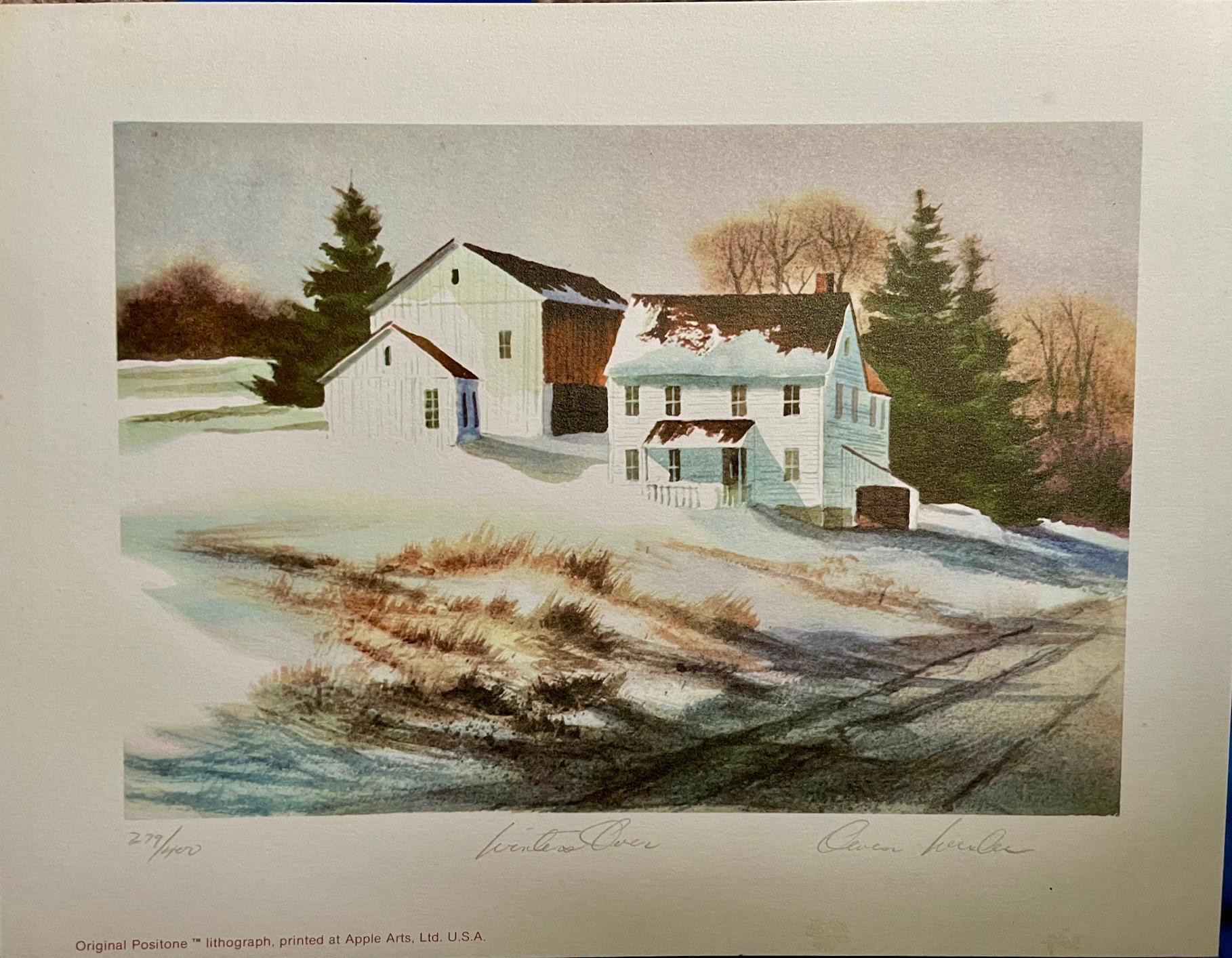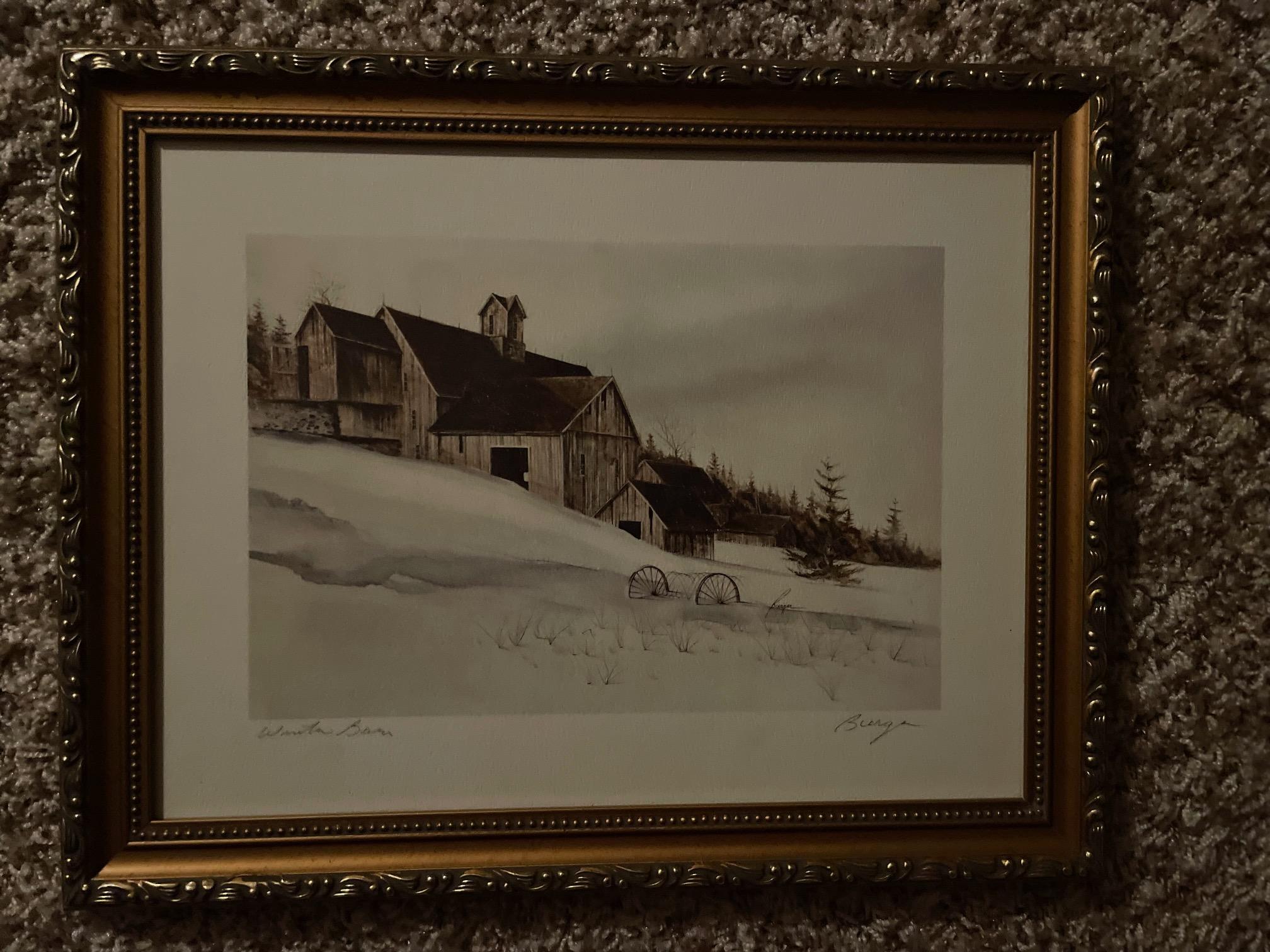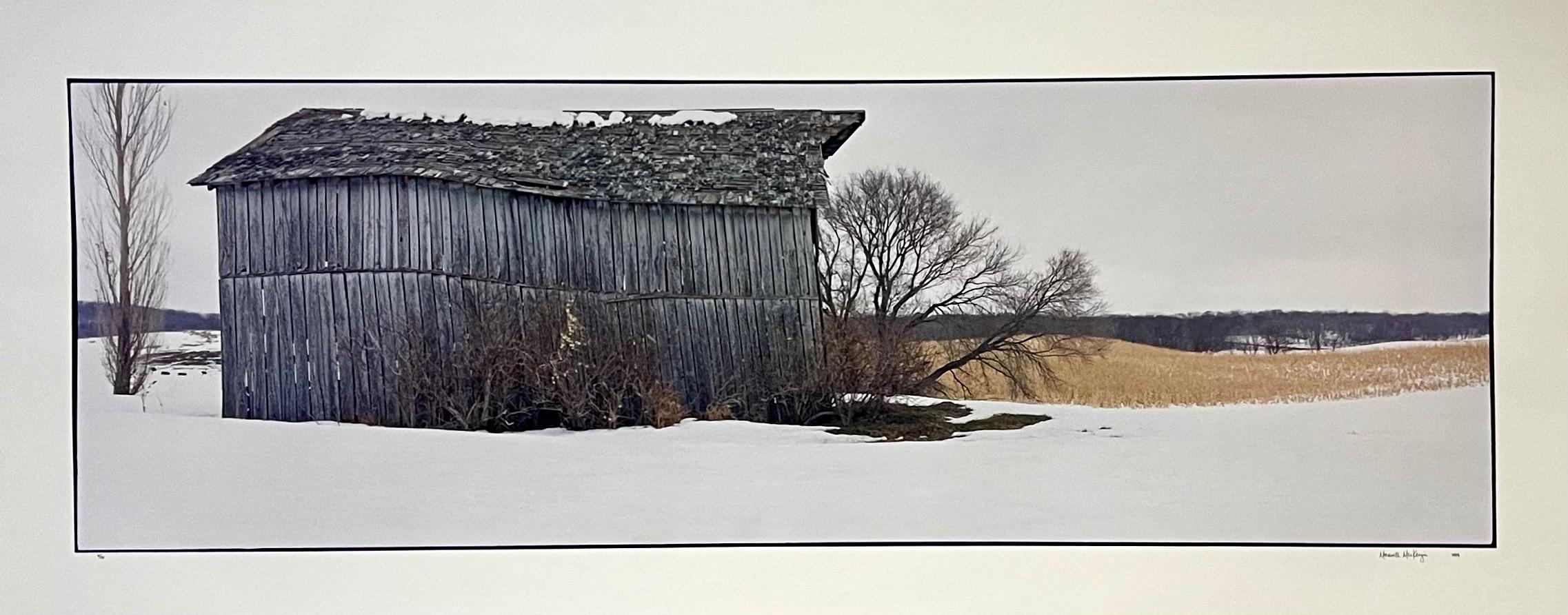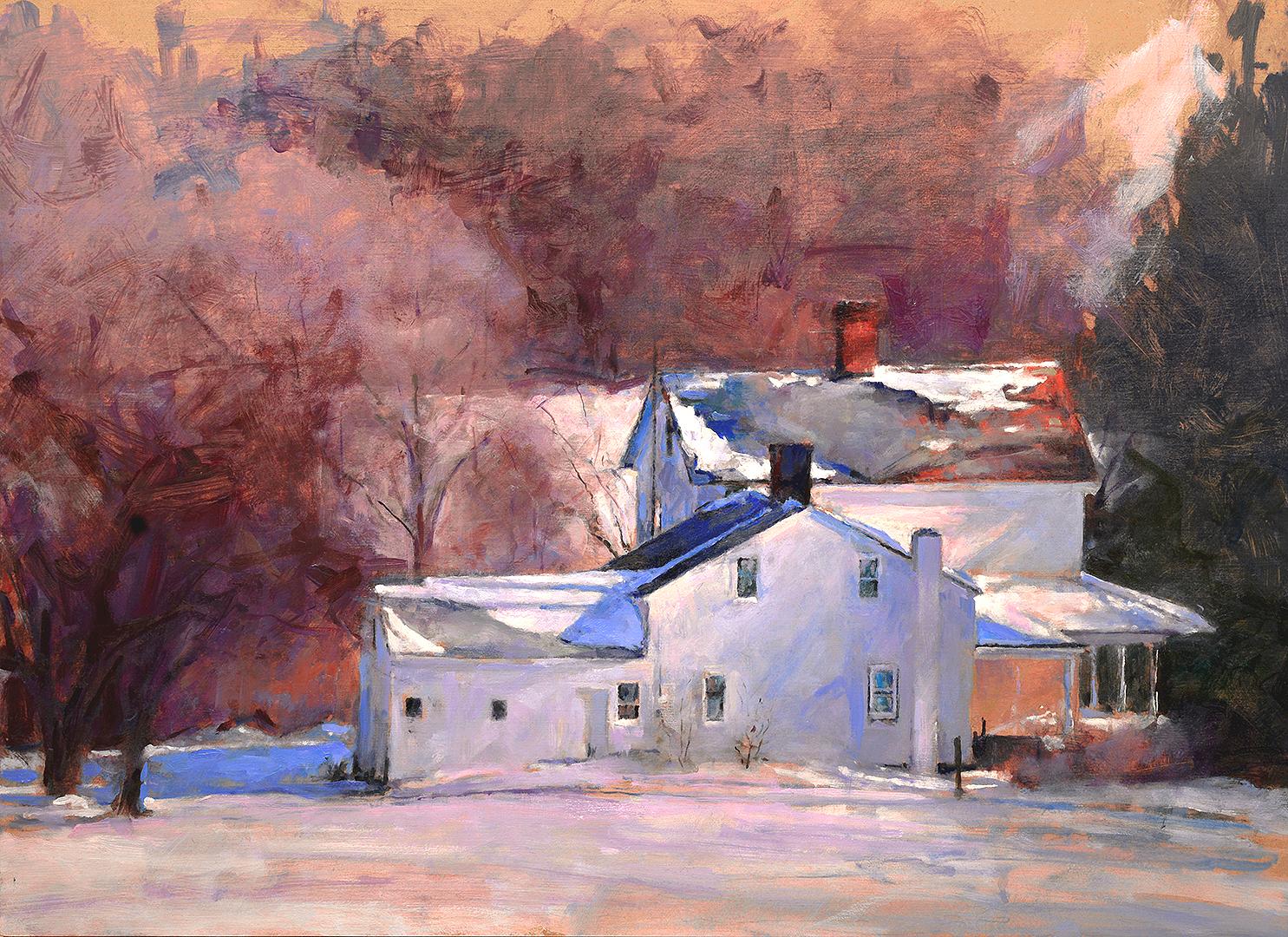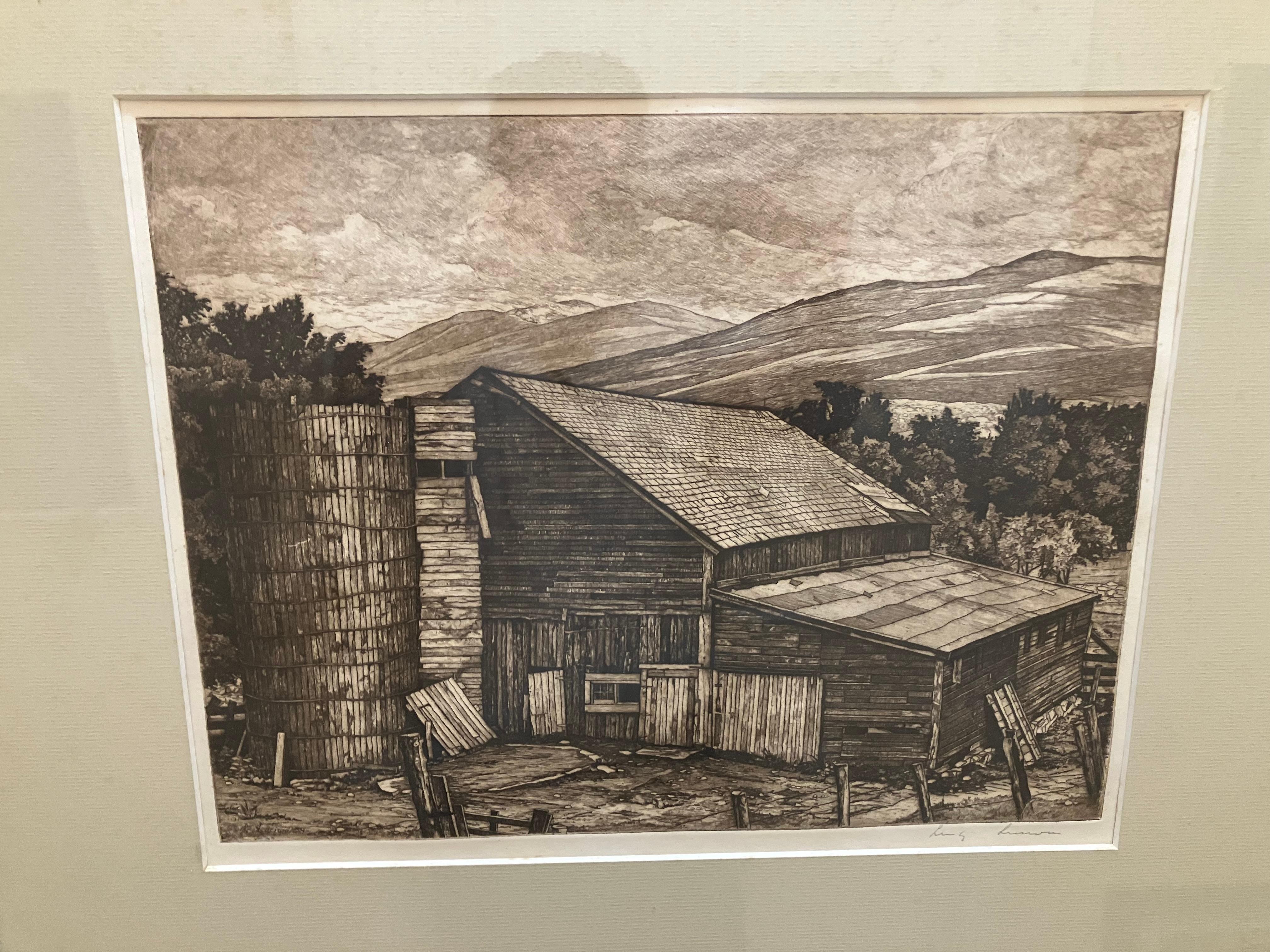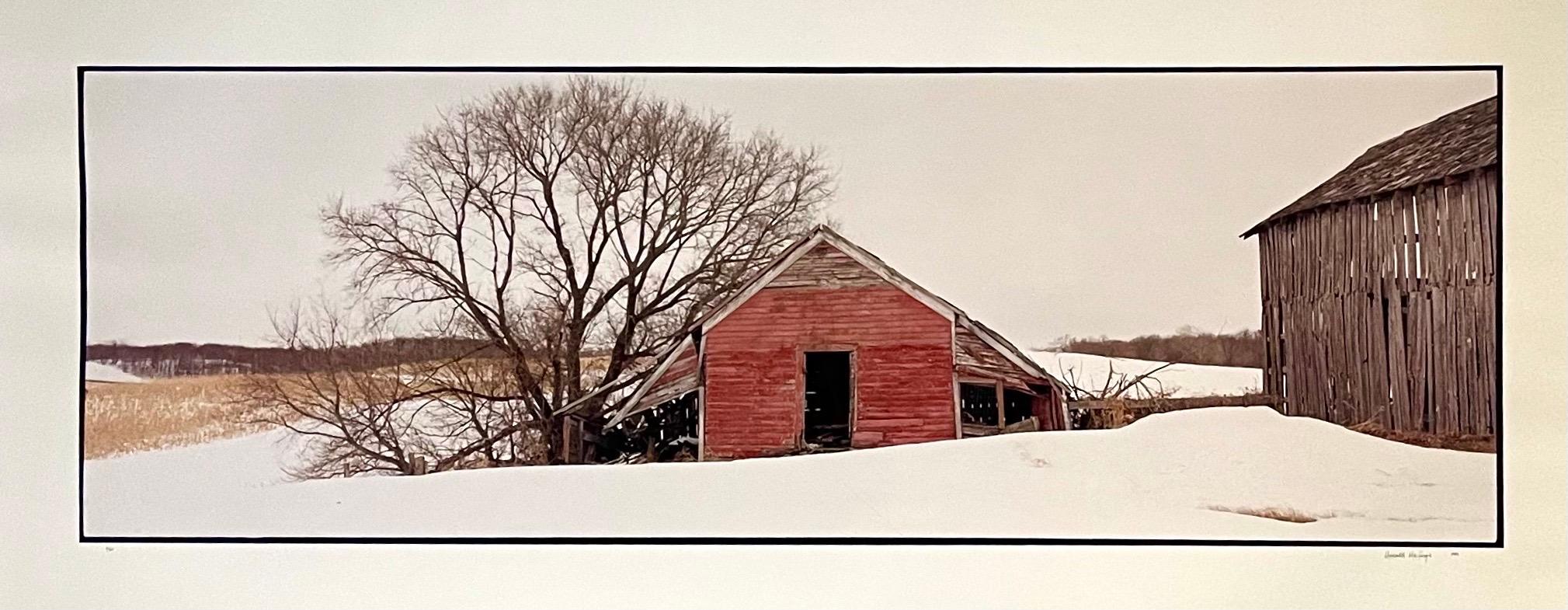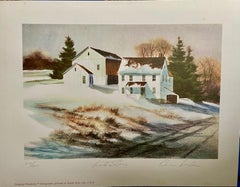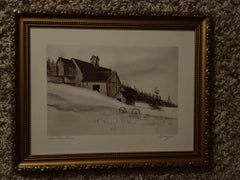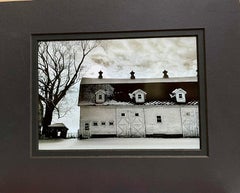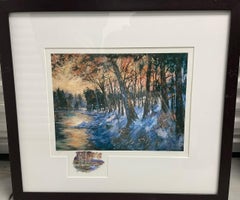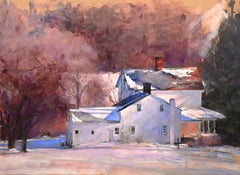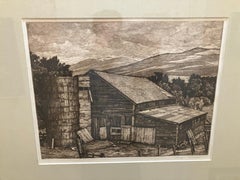Items Similar to "Winter's Over" barn scene by Owen Wexler
Video Loading
Want more images or videos?
Request additional images or videos from the seller
1 of 7
Unknown"Winter's Over" barn scene by Owen Wexler
$56
$7020% Off
£43.43
£54.2920% Off
€49.23
€61.5420% Off
CA$80.15
CA$100.1820% Off
A$87.58
A$109.4720% Off
CHF 45.40
CHF 56.7520% Off
MX$1,046.22
MX$1,307.7720% Off
NOK 577.77
NOK 722.2120% Off
SEK 540.93
SEK 676.1620% Off
DKK 367.61
DKK 459.5120% Off
About the Item
Winter is serene in this landscape of a barn in winter as it begins to fade and head to spring.
Owen Wexler is the artist; this is a limited edition lithograph signed and titled by him.
- Dimensions:Height: 9 in (22.86 cm)Width: 11 in (27.94 cm)
- More Editions & Sizes:9 x 11Price: $70
- Medium:
- Movement & Style:
- Period:
- Framing:Framing Options Available
- Condition:
- Gallery Location:Chesterfield, MI
- Reference Number:1stDibs: LU1263114544152
About the Seller
4.8
Vetted Professional Seller
Every seller passes strict standards for authenticity and reliability
Established in 2013
1stDibs seller since 2019
337 sales on 1stDibs
Typical response time: 1 to 2 days
- ShippingRetrieving quote...Shipping from: Clinton Township, MI
- Return Policy
More From This Seller
View All"Winter's Over" barn scene by Owen Wexler
Located in Chesterfield, MI
Winter is serene in this landscape of a barn in winter as it begins to fade and head to spring.
Owen Wexler is the artist; this is a limited edition lithograph signed and titled by him.
Category
Mid-20th Century American Realist Landscape Prints
Materials
Lithograph
$56 Sale Price
20% Off
"Winter Barn" by artist named Berger
Located in Chesterfield, MI
Winter--in all its delicate beauty-- in this lithograph by artist named Berger who pencil signed it and titled it also.
It is beautifully framed in a gold wooden frame.
Category
Late 20th Century Realist Landscape Prints
Materials
Lithograph
$96 Sale Price
20% Off
Barn in Winter
Located in Chesterfield, MI
"Barn in Winter" is an original photograph taken near the cemetery where the photographer's mother is buried
near Monroe, Michigan.
Image size: 5 x 7
8 x 10 with frame made of mat ma...
Category
2010s Naturalistic Photography
Materials
Photographic Paper
$48 Sale Price
20% Off
The Four Seasons--Winter
By Michael Schofield
Located in Chesterfield, MI
Michael Schofield created The Four Seasons; this is Winter. It is a limited edition Artist Proof, and it is also remarqued and signed by the artist.
This lithograph may be purchase...
Category
Mid-20th Century Realist Landscape Prints
Materials
Lithograph
$160 Sale Price
20% Off
"Green Pastures" by Gene Pelham. Printed in U.S.A.
Located in Chesterfield, MI
New York Graphic Society
Printed in USA, plate signed.
Good condition
13.5 x 16 in.
Category
20th Century Landscape Prints
Materials
Lithograph
$120 Sale Price
20% Off
"Barn and Wagonwheel" by the artist Jowis
Located in Chesterfield, MI
Barns are very suitable for decorating in almost every room. An option for this small limited edition lithograph: it can be matted to fit a larger space.
We offer many different fra...
Category
Mid-20th Century Realist Landscape Prints
Materials
Lithograph
$72 Sale Price
20% Off
You May Also Like
Barn in Snow, Winter Landscape, Large Panoramic Color Photograph Signed Photo
By Maxwell Mackenzie
Located in Surfside, FL
Fabulous American landscape photography of a rural school house.
from small hand signed edition of 20
Large Chromogenic print on Kodak Professional Paper
The sheets are approximatel...
Category
1990s American Realist Color Photography
Materials
Color
Andrus-Farm, Winter
By Peter Poskas III
Located in Greenwich, CT
A native son of New England, Peter Poskas III—like many American artists before him—derives inspiration from the charming towns and tranquil landscapes of coastal Maine and Connectic...
Category
2010s American Realist Landscape Paintings
Materials
Oil, Panel
Luigi Lucioni Vermont Barn
By Luigi Lucioni
Located in San Francisco, CA
Luigi Lucioni: 1900-1988. Very well listed American Painter and etcher. He has Auction results as high as $4600 for an etching. This adding is most likely a barn in Vermont.. It meas...
Category
1950s American Realist Landscape Prints
Materials
Etching
Farm, Winter Landscape, Large Panoramic Vintage Color Photograph Signed Photo
By Maxwell Mackenzie
Located in Surfside, FL
Maplewood Township Homestead, Winter, 1993
Fabulous American landscape photography of a rural landscape scene.
from small hand signed edition of 20
Large Format Chromogenic print on Kodak Professional Paper
The sheets are approximately 30 X 56 inches
the images are around 16 X 48.25 inches
Some of them are cut a bit irregularly, they should all mat out fine for framing.
These are vintage large-format architectural chromogenic print photographs hand signed and dated and hand numbered from the edition of 20 in the lower margin.
The collection depicts attractive examples of Mackenzie's wide-lens studies of architecture, such as barns and abandoned houses, set into richly colored landscapes.
Maxwell MacKenzie is an award-winning professional and fine-art photographer based in Washington, DC and Minnesota. Over the past thirty-five years, his photographic assignments have taken him to 20 states and a dozen foreign countries, including Austria, the Bahamas, Bermuda, Brazil, Brussels, England, France, Greece, Morocco, Norway, Sweden, and Wales.
Three books of Mackenzie's fine-art photographs have been published: Abandonings, (1995), color panoramic photographs of his native Otter Tail County, MN, which was awarded the Silver Medal Award for Excellence from Photo District News; American Ruins, Ghosts on the Landscape, (2001) black & white panoramics made in Montana, Idaho, Minnesota, Wisconsin and the Dakotas; and Markings, (2007), color abstract aerials made from his self-piloted, powered-parachute, a 300 pound, ultra-light aircraft.
MacKenzie’s work is included in the permanent collection of The Phillips Collection as well as hundreds of private and corporate collections, including Exxon, Citibank, Deloitte & Touche, Dow Jones, Fannie Mae, The New York Hospital, Goldman Sachs, JP Morgan, the Union Bank of Switzerland, Phillip Morris, and the Washington Post. His fine-art photographs of the American West are also included in numerous American Embassy collections including Bogota, Lima, Lagos, and Moscow.
His work has been exhibited in dozens of museums and galleries all over the country, including solo shows at The Contemporary Art Center of Virginia, Virginia Beach; The American Institute of Architects, DC; The Nordic Heritage Museum, in Seattle, WA; The Piedmont Arts Association, Martinsville, VA; the Julie Saul Gallery in NYC, the DNJ Gallery in LA; The Gallatin River Gallery...
Category
1990s American Realist Color Photography
Materials
Color
Farm, Winter Landscape, Large Panoramic Vintage Color Photograph Signed Photo
By Maxwell Mackenzie
Located in Surfside, FL
Maplewood Township Homestead, Winter, 1993
Fabulous American landscape photography of a rural landscape scene.
from small hand signed edition of 20
Large Format Chromogenic print on Kodak Professional Paper
The sheets are approximately 30 X 56 inches
the images are around 16 X 48.25 inches
Some of them are cut a bit irregularly, they should all mat out fine for framing.
These are vintage large-format architectural chromogenic print photographs hand signed and dated and hand numbered from the edition of 20 in the lower margin.
The collection depicts attractive examples of Mackenzie's wide-lens studies of architecture, such as barns and abandoned houses, set into richly colored landscapes.
Maxwell MacKenzie is an award-winning professional and fine-art photographer based in Washington, DC and Minnesota. Over the past thirty-five years, his photographic assignments have taken him to 20 states and a dozen foreign countries, including Austria, the Bahamas, Bermuda, Brazil, Brussels, England, France, Greece, Morocco, Norway, Sweden, and Wales.
Three books of Mackenzie's fine-art photographs have been published: Abandonings, (1995), color panoramic photographs of his native Otter Tail County, MN, which was awarded the Silver Medal Award for Excellence from Photo District News; American Ruins, Ghosts on the Landscape, (2001) black & white panoramics made in Montana, Idaho, Minnesota, Wisconsin and the Dakotas; and Markings, (2007), color abstract aerials made from his self-piloted, powered-parachute, a 300 pound, ultra-light aircraft.
MacKenzie’s work is included in the permanent collection of The Phillips Collection as well as hundreds of private and corporate collections, including Exxon, Citibank, Deloitte & Touche, Dow Jones, Fannie Mae, The New York Hospital, Goldman Sachs, JP Morgan, the Union Bank of Switzerland, Phillip Morris, and the Washington Post. His fine-art photographs of the American West are also included in numerous American Embassy collections including Bogota, Lima, Lagos, and Moscow.
His work has been exhibited in dozens of museums and galleries all over the country, including solo shows at The Contemporary Art Center of Virginia, Virginia Beach; The American Institute of Architects, DC; The Nordic Heritage Museum, in Seattle, WA; The Piedmont Arts Association, Martinsville, VA; the Julie Saul Gallery in NYC, the DNJ Gallery in LA; The Gallatin River Gallery...
Category
1990s American Realist Color Photography
Materials
Color
Landscape with Farm House in Winter
By Charles Frederick Surendorf
Located in San Francisco, CA
This artwork "Landscape with Farm House in Winter" c.1950, is a oil painting on hardboard by noted California artist Charles Frederick Surendorf, 1906-1979. It is signed at the lower...
Category
Mid-20th Century American Impressionist Landscape Paintings
Materials
Oil
More Ways To Browse
Whistler Limehouse
1910 Etching Nyc
1919 Thomas Moran 1919
Altman Benches
Andy Warhol Brooklyn Bridge
Ann Reeves
Antony Gormley Horizon Field
Arthur John Strutt
Bill Ogden
Bob Dylan Train Tracks
Brooklyn Bridge Warhol
Buell Whitehead
Calder Soleil
California Wine Posters
Cannes Vintage Travel Poster
Charles Wysocki
Childe Hassam On Sale
Currier Ives New York
